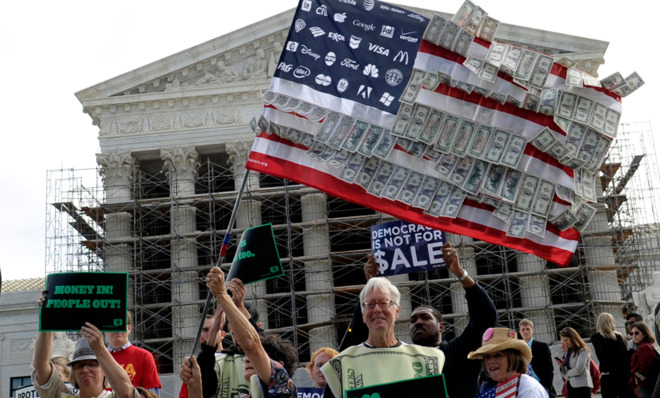How Citizens United backfired on the GOP
A reminder to interest groups on both sides: Be careful what you wish for

A free daily email with the biggest news stories of the day – and the best features from TheWeek.com
You are now subscribed
Your newsletter sign-up was successful
It's no secret that the corporate class is being eclipsed by Tea Party libertarians and is increasingly unable to exert influence on the Republican Party, despite the generous donations the top 1 percent has long showered on Republicans.
But isn't the Republican Party in the business of serving Big Business? And didn't the Supreme Court ruling in Citizens United open the floodgates of corporate campaign cash? How is all that corporate campaign cash failing to buy Big Business sway over the GOP?
Well, here's the thing: Citizens United didn't save the Republican Party. Citizens United broke the Republican Party.
The Week
Escape your echo chamber. Get the facts behind the news, plus analysis from multiple perspectives.

Sign up for The Week's Free Newsletters
From our morning news briefing to a weekly Good News Newsletter, get the best of The Week delivered directly to your inbox.
From our morning news briefing to a weekly Good News Newsletter, get the best of The Week delivered directly to your inbox.
Yes, Citizens United was what Republicans and their corporate patrons wanted. Corporations are people. Money is speech. Spend what you want, and no one needs to know who wrote the check.
But as conservative columnist Tim Carney explains in a criminally overlooked Washington Examiner column from last month, what Citizens United meant in practice is this: It "spawned super PACs that offset the power of the political parties and K Street."
Carney specifically credits the newly created Senate Conservatives Fund and Heritage Action groups for using the new post–Citizens United rules to fund right-wing challengers who have triumphed over Republican establishment favorites, whipping up conservative grassroots fervor behind extremist positions and forcefully shaming any Republican who hints at compromise. They have their own informal "whip operation" that robs Speaker John Boehner and Senate Minority Leader Mitch McConnell of their traditional institutional power. And they have been squarely behind the plot to defund ObamaCare by forcing a government shutdown.
Carney says this Citizens United–fueled dynamic has led to a "Republican leadership vacuum." I would go a step further: It has broken the Republican Party in two.
A free daily email with the biggest news stories of the day – and the best features from TheWeek.com
Both the ascendant Senate Conservatives Fund and Heritage Action groups are financially backed by the libertarian billionaire Koch brothers, leaders of a single corporation that appears to be trying to surpass the Chamber of Commerce as the dominant funder and power center of the Republican Party.
In the 2012 elections, the Chamber of Commerce and the Koch-backed Americans for Prosperity each spent roughly $35 million. But since then, the Kochs have used another group they created, Freedom Partners Chamber of Commerce, to spend $200 million supporting an array of organizations determined to destroy ObamaCare.
According to Open Secrets, Freedom Partners Chamber of Commerce spending now "dwarfs" the old Chamber, which has been urging Republicans to keep the government open and increase the debt limit, to no avail. The establishment Chamber has become so frustrated with being ignored, it is preparing an effort to donate money to Republican congresspeople who face primary challenges from the right, a direct challenge to the Senate Conservatives Fund and its allies.
The Republican Party is stuck with two major corporate funders vying for influence and pulling the party apart. Yet the organization with the broader business base and more rational political outlook is being out-organized and out-spent by a narrow band of ideological extremists who have figured out how to best exploit a Citizens United world. Recent research has found that Citizens United did not entice corporate America en masse to increase its election spending, but as The New York Times's Eduardo Porter noted, "Big, frequent donors are particularly extreme."
The end result is a party compelled to carry out a doomed legislative strategy concocted by the party's most aggressive funders. If fully carried out to its apocalyptic conclusion, the strategy risks obliterating the Republican Party's brand for a generation.
Just one year ago, Democrats were terrified that Citizens United would not only drown Barack Obama in a flood of GOP-friendly corporate cash, but also make it impossible for liberal Democrats to ever have a chance at winning national elections.
But the reverse may end up being Citizens United's true political legacy.
Obama used the specter of freshly legalized super PACs to rev up his donor base, and raised more money than any presidential candidate in history, neutralizing the Republican super PACs. He kept his party unified, turned out his base, and won decisively. In the election's aftermath, well-funded but strategically inept right-wing super PACs are financing deep intraparty discord, threatening the ability of Republicans to be competitive in national elections.
Turns out the upholding of the Affordable Care Act isn't the only gift Chief Justice John Roberts gave to President Obama.
Bill Scher is the executive editor of LiberalOasis.com and the online campaign manager at Campaign for America's Future. He is the author of Wait! Don't Move To Canada!: A Stay-and-Fight Strategy to Win Back America, a regular contributor to Bloggingheads.tv and host of the LiberalOasis Radio Show weekly podcast.
-
 What to watch out for at the Winter Olympics
What to watch out for at the Winter OlympicsThe Explainer Family dynasties, Ice agents and unlikely heroes are expected at the tournament
-
 Properties of the week: houses near spectacular coastal walks
Properties of the week: houses near spectacular coastal walksThe Week Recommends Featuring homes in Cornwall, Devon and Northumberland
-
 Will Beatrice and Eugenie be dragged into the Epstein scandal?
Will Beatrice and Eugenie be dragged into the Epstein scandal?Talking Point The latest slew of embarrassing emails from Fergie to the notorious sex offender have put her daughters in a deeply uncomfortable position
-
 The billionaires’ wealth tax: a catastrophe for California?
The billionaires’ wealth tax: a catastrophe for California?Talking Point Peter Thiel and Larry Page preparing to change state residency
-
 Bari Weiss’ ‘60 Minutes’ scandal is about more than one report
Bari Weiss’ ‘60 Minutes’ scandal is about more than one reportIN THE SPOTLIGHT By blocking an approved segment on a controversial prison holding US deportees in El Salvador, the editor-in-chief of CBS News has become the main story
-
 Has Zohran Mamdani shown the Democrats how to win again?
Has Zohran Mamdani shown the Democrats how to win again?Today’s Big Question New York City mayoral election touted as victory for left-wing populists but moderate centrist wins elsewhere present more complex path for Democratic Party
-
 Millions turn out for anti-Trump ‘No Kings’ rallies
Millions turn out for anti-Trump ‘No Kings’ ralliesSpeed Read An estimated 7 million people participated, 2 million more than at the first ‘No Kings’ protest in June
-
 Ghislaine Maxwell: angling for a Trump pardon
Ghislaine Maxwell: angling for a Trump pardonTalking Point Convicted sex trafficker's testimony could shed new light on president's links to Jeffrey Epstein
-
 The last words and final moments of 40 presidents
The last words and final moments of 40 presidentsThe Explainer Some are eloquent quotes worthy of the holders of the highest office in the nation, and others... aren't
-
 The JFK files: the truth at last?
The JFK files: the truth at last?In The Spotlight More than 64,000 previously classified documents relating the 1963 assassination of John F. Kennedy have been released by the Trump administration
-
 'Seriously, not literally': how should the world take Donald Trump?
'Seriously, not literally': how should the world take Donald Trump?Today's big question White House rhetoric and reality look likely to become increasingly blurred